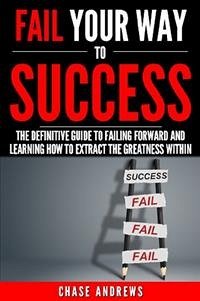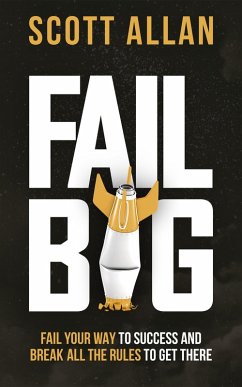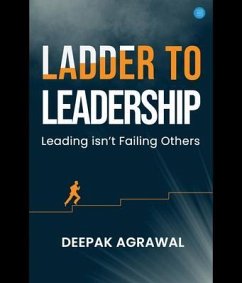
Fail first. Fail Fast. Fail Frequently. (eBook, ePUB)
Sofort per Download lieferbar
2,99 €
inkl. MwSt.

PAYBACK Punkte
0 °P sammeln!
"Fail First, Fail Fast, Fail Frequently" is a motivational book that guides and emphasizes the importance of first and foremost accepting failure and embracing it as a necessary step toward achieving success.The author argues that the negative consequences of a post failing scenario, often hold individuals back from pursuing their dreams and taking risks. By changing our perspective, attitudes and how we should react on failures, only then can we unlock new opportunities for growth and learning.Chapter 1: Failing first. The book clears the cob-webs of confusion surrounding around the sensitive...
"Fail First, Fail Fast, Fail Frequently" is a motivational book that guides and emphasizes the importance of first and foremost accepting failure and embracing it as a necessary step toward achieving success.
The author argues that the negative consequences of a post failing scenario, often hold individuals back from pursuing their dreams and taking risks. By changing our perspective, attitudes and how we should react on failures, only then can we unlock new opportunities for growth and learning.
Chapter 1: Failing first. The book clears the cob-webs of confusion surrounding around the sensitive topic of failing and failures. Success to all is Hero and failure is zero. Failing is inevitable. It is a part and parcel of life.
Chapter 2: Fail fast. In this chapter, the authors redefine what it means to fail, sooner or later. It is better to face failure fast and recover from the side effects of failures ASAP. The author Denzil Dias suggests, that instead of viewing failure as a negative outcome, it should be seen as a stepping stone towards success.
Chapter 3: Fail frequently. The author emphasizes the importance of learning from mistakes. Learning from mistakes done all throughout one's life. Mistakes and failures happen only with the living and not with the dead. Hence there is a need to embrace and overcome our mistakes wholeheartedly.
This book tries to communicate, to consider failures as experiments in life gone wrong. We must continue correcting the experiments gone wrong in our personal and professional life. The author advocates for a trial-and-error approach where individuals are encouraged to test ideas quickly hence the title of "Fail Frequently" and learn from the outcomes without fear of what comes along with failing.
By encouraging open communication about mistakes, and fostering an environment where every human being (child, student, teacher, professor, professionals, businessman, entrepreneurs) feel safe to experiment, (take chances with failures) and companies can drive for continuous innovation and growth.
Conclusion "Fail First, Fail Fast, Fail Frequently" serves as an empowering reminder that failure is not something to be feared but rather embraced as an essential part of the journey toward ultimate success.
The author argues that the negative consequences of a post failing scenario, often hold individuals back from pursuing their dreams and taking risks. By changing our perspective, attitudes and how we should react on failures, only then can we unlock new opportunities for growth and learning.
Chapter 1: Failing first. The book clears the cob-webs of confusion surrounding around the sensitive topic of failing and failures. Success to all is Hero and failure is zero. Failing is inevitable. It is a part and parcel of life.
Chapter 2: Fail fast. In this chapter, the authors redefine what it means to fail, sooner or later. It is better to face failure fast and recover from the side effects of failures ASAP. The author Denzil Dias suggests, that instead of viewing failure as a negative outcome, it should be seen as a stepping stone towards success.
Chapter 3: Fail frequently. The author emphasizes the importance of learning from mistakes. Learning from mistakes done all throughout one's life. Mistakes and failures happen only with the living and not with the dead. Hence there is a need to embrace and overcome our mistakes wholeheartedly.
This book tries to communicate, to consider failures as experiments in life gone wrong. We must continue correcting the experiments gone wrong in our personal and professional life. The author advocates for a trial-and-error approach where individuals are encouraged to test ideas quickly hence the title of "Fail Frequently" and learn from the outcomes without fear of what comes along with failing.
By encouraging open communication about mistakes, and fostering an environment where every human being (child, student, teacher, professor, professionals, businessman, entrepreneurs) feel safe to experiment, (take chances with failures) and companies can drive for continuous innovation and growth.
Conclusion "Fail First, Fail Fast, Fail Frequently" serves as an empowering reminder that failure is not something to be feared but rather embraced as an essential part of the journey toward ultimate success.
Dieser Download kann aus rechtlichen Gründen nur mit Rechnungsadresse in A, B, CY, CZ, D, DK, EW, E, FIN, F, GR, H, IRL, I, LT, L, LR, M, NL, PL, P, R, S, SLO, SK ausgeliefert werden.












